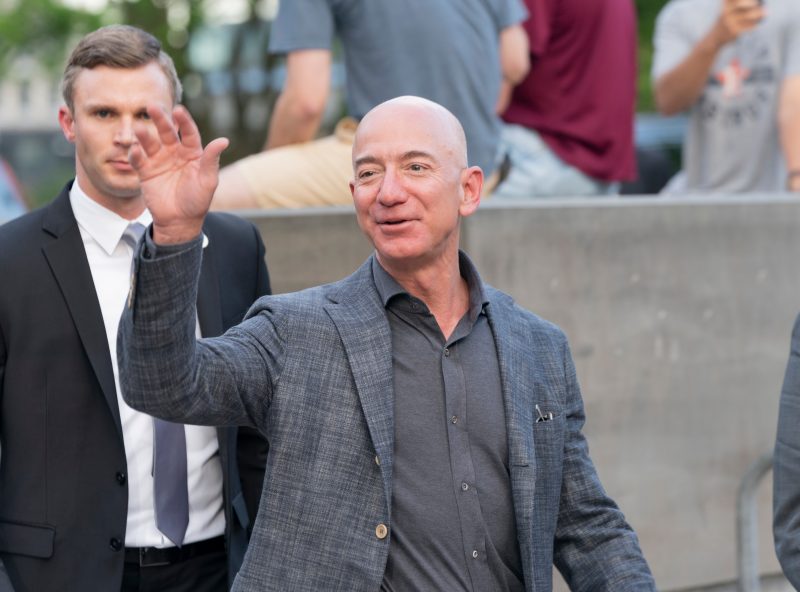By Dileep Rao – Guest Contributor
Note: This is an excerpt from a series on unicorn-entrepreneurs.
Jeff Bezos has left as the CEO of Amazon.com, a company he built from an idea to one of the world’s greatest companies (and I am not commenting on his HR policies). As he literally and figuratively exited from the world’s greatest stage (and moves to space), here are 7 lessons that earthbound entrepreneurs can learn from a generational talent.
When the Internet revolution started, Jeff Bezos was working for a Wall Street firm. As he saw the Internet unfold, and examined the growth rate of the emerging trend, he packed his family and belongings and moved West to Seattle. On the way he narrowed his list of products that he wanted to sell and developed his business plan to focus on one product—books. From books, he expanded to everything under the sun—and also dominates the guts of the Internet with Amazon Web Services (AWS).
#1. Jump on an emerging, high-potential trend.
Nearly every unicorn-entrepreneur entered an emerging trend and dominated it, from the founders of Intel to the founders of Airbnb and Uber. When Bezos saw that Internet usage was growing at an annual rate of 2,300 percent, he did what most billion-dollar entrepreneurs did—he started to look for opportunities in the emerging trend. Bezos jumped on the greatest of all trends of the recent past, the Internet, which has and will continue to change everything about the world. He was one of the first to jump on this trend when it was just emerging and gave up an attractive job to launch Amazon.
#2. Focus on strategic innovation, not product innovation.
The common myth is that successful entrepreneurs are first movers. The reality is that 89% of first movers fail to dominate. Unicorn-entrepreneurs who dominate usually imitate the product, or use a product that can be easily imitated, and improve the strategy to dominate the fulcrum of the emerging trend. Bezos was no exception. He sold books—not exactly an innovative product. But his strategic innovation was that he sold it on the Internet as it was emerging to get an edge over the much larger store-based booksellers like Borders and Barnes & Noble.
#3. Seek a platform for long-term potential.
After getting a foothold on the emerging trend, unicorn-entrepreneurs then build a platform to consolidate their dominance of the emerging trend. Just as Apple and Microsoft and Walmart have used their platforms to sell a variety of products and services and avoid becoming obsolete, Amazon.com did the same. Amazon developed its platform with other products, other sellers, and AWS. And then he built a platform with other products and other merchants, and his cloud computing service, AWS, to solidify his control of the Internet. Amazingly, he sold cloud services to Target, one of his competitors.
#4. Focus on cash flow till Aha.
Bezos is famous for his frugality. As Amazon noted, “we try not to spend money on things that don’t matter to customers.” He started in the proverbial garage and used doors as desks.
#5. Finance to control the venture.
Early VC is controlling VC. 94% of unicorn-entrepreneurs avoided or delayed VC to grow with control. They kept control of their venture and of the wealth they created. Bezos was financed by his parents and got about $1,000,000 from about 20 angels. He is said to have warned his investors that they had a 30% chance of success and gave them about 20% of the company. Bezos also received a small amount of venture capital from a Seattle VC firm and, after take-off, from Kleiner Perkins in Silicon Valley. After take-off, VCs wanted to fund him and he could pick anyone he wanted. These strategies helped Bezos stayed in control of the company.
#6. Take off with limited capital to control the venture.
Unicorn-entrepreneurs needed skills and smart strategies to take-off with control and with less capital. After raising capital from family and friends, Bezos recruited a top programmer called Shel Kaplan. He then asked 300 friends and members of his network to test the site. The feedback was very positive. Bezos launched Amazon and sold products in 46 countries without any marketing investment.
#7. Get the right skills on an emerging trend.
Bezos had a computer science degree from Princeton and was working at a leading Wall Street firm applying his skill in the world of finance. When he started Amazon.com he recruited skilled programmers to launch his web site and learned how to sell books. Bezos started with three of the foundational skills of unicorn-entrepreneurship:
- Technical skills in an emerging trend or industry.
- Sales skills to sell your product.
- Finance-smart skills to raise capital so you can grow with control.
MY TAKE: Unicorn-entrepreneurs are rare. They tread on many toes as they build their iconic companies, but they leave long-lasting footprints. And their shoes are hard to fill. Bezos was one of the best of this group.
This column was first published in Forbes.
Dileep Rao is the author of Finance Secrets of Billion-Dollar Entrepreneurs (FIU Business Press, November 2020) and teaches entrepreneurship, unicorn-entrepreneurship, and venture financing at Florida International University. He is a former venture financier.
READ MORE from Dileep Rao:
WHAT CAN YOU LEARN FROM AIRBnB: FOCUS ON YOUR SKILLS, NOT THE IDEA
WHY 100% OF VENTURE CAPITAL CAN BE EXPLAINED IN ONE 4-LETTER WORD
HOW FINANCE-SMART ENTREPRENEURS FIND FINANCING IN A FINANCE-SHORT WORLD
GRIT V. GLAM: THE 2 FACES OF BILLION-DOLLAR ENTREPRENEURSHIP

